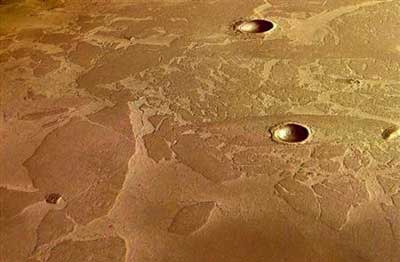
Europe, Russia ready for big Mars mission
Moscow, March 16, 2013
Europe and Russia have signed a deal for a joint Mars mission which will bore beneath the Red Planet's surface for soil samples they hope will solve the mystery of whether there is life beyond Earth.
Europe's space agency had hoped to work with National Aeronautics and Space Administration (Nasa) on the two-spacecraft ExoMars mission but turned to the Russians after the US agency pulled out due to budget shortfalls.
The announcement comes amid heightened excitement over the search for life on the planet in our solar system most like Earth after scientists said analysis from Nasa's own mission rover, Curiosity, showed Mars had the right ingredients for life.
European scientists say the two-stage mission, with the two craft to be launched in 2016 and 2018, will pave the way for what Nasa has described as the "Holy Grail" of Mars exploration: a separate mission to return dirt samples from the Red Planet.
"Curiosity learnt us a little bit, ExoMars will bring us a step further, but bringing back those samples to Earth you can do 10 to 100 times more analysis," Rolf de Groot, head of the European Space Agency's (ESA) Robotic Exploration Coordination Office, told Reuters.
"That is a goal of everybody who works on Mars exploration."
The Europe-Russia mission hopes to take scientists beyond Nasa's finding that the surface of Earth's neighboring planet had the right mix of elements to sustain life, by drilling 2 meters below its radiation-hit surface for samples.
"Nasa is also drilling, but two centimeters deep," de Groot said, referring to the ongoing Curiosity mission. "It's a completely different story."
"ExoMars, by drilling 2 meters into the ground, might hope to identify really the big molecules because that would be a direct indication of the presence of life or that life once existed on Mars."
He said the ESA's Mars rover would also be equipped with a much more advanced laboratory than Curiosity has, so would be able to carry out more detailed analysis.
Russian Space Agency Roskosmos will provide the rockets to launch the ExoMars - short for Exobiology on Mars - mission and will also design the descent module and surface platform.
Europe turned to Russia after Nasa left the $1.3 billion project in February 2012, citing a budget crunch. The ESA and Roskosmos agreed to cooperate last April, but talks to work out the details dragged on for nearly a year.
"This event was a long time in the making and took a great deal of collaboration," Roskosmos head Vladimir Popovkin said after signing the deal with ESA Director Jean-Jacques Dordain in Paris.
Russia's involvement in the ambitious mission could boost the status of its once-pioneering space agency after a litany of costly and embarrassing failures.
The delays in agreeing the mission hinged on the extent of Russia's participation, according to Russian space experts who said Moscow had seemed to reach its goal of full partnership.
"The agreement implies that Russian scientists and engineers will become full-fledged participants in all the international scientific and technical groups," Roskosmos said in a statement.
What was to be Russia's first deep space mission in more than two decades - the Phobos-Grunt mission to scoop up soil samples from Mars - was among five botched launches that damaged Moscow's reputation as a reliable launch partner.
European governments have so far committed 850 million euros to the mission. The funding cap has been set at 1 billion euros ($1.3 billion) but delays and changes to the scientific aspects of the project are expected to drive up the price tag.
Even though Nasa pulled out, it will still provide radio communications equipment, an important organics experiment and engineering and mission support.
The United States also plans to follow up its Curiosity rover with an identical probe, to launch in 2020. It has not yet decided if it will cache samples for a future return to Earth.
The US National Academy of Sciences in 2011 ranked a Mars sample return mission as its top priority in planetary science for the next decade. The long-term goal of the US human space program is to land astronauts on Mars in the 2030s.-Reuters







